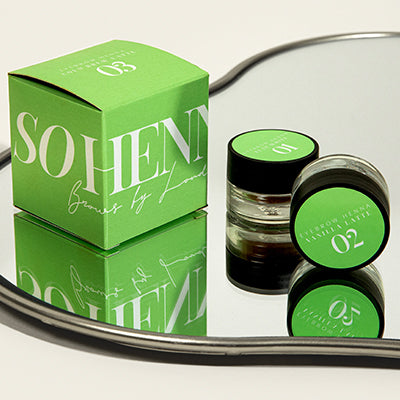FREE STANDARD SHIPPING FOR ORDERS OVER 99€!
FREE STANDARD SHIPPING FOR ORDERS OVER 99€!
Glues & Liquids
Eyelash Extensions
ACCESSORIES
So Henna

Pregnant Customers: Eyelash Extensions & Henna Brow Treatments
октомври 20, 2023 4 min read
Eyelash Extensions and So Henna Brow Treatments for Pregnant Customers
Pregnancy is a remarkable journey that brings about numerous changes in a woman's life, including her beauty routine. Many expectant mothers wonder about the safety of certain cosmetic procedures, including eyelash extensions and brow treatments. Among the beauty treatments available, lash extensions and henna brows have gained immense popularity in recent years. However, when it comes to pregnant customers, concerns about potential risks and safety precautions arise. In this article, we will explore whether a Technician can safely provide these beauty procedures to a pregnant customer.

Understanding The Treatments
Eyelash extensions are a cosmetic enhancement in which individual synthetic and hypoallergenic Extensions are glued to the natural eyelashes to create a fuller and longer lash appearance. The process requires precision and the use of adhesive substances, which raises questions about its safety during pregnancy.
So Henna brows treatment is a beauty procedure that focuses on enhancing the appearance of the eyebrows by tinting them with natural henna dye. The treatment provides a fuller, more defined look, filling in any gaps or sparse areas in the brows. So Henna Powder can stain not only the hair but the skin as well, providing results that typically last for several weeks, depending on skin type and aftercare.

The Concerns
Pregnant women often have concerns about their health and the well-being of their unborn child. These concerns can extend to everyday activities and even beauty treatments like eyelash extensions and brow treatments. Here are some of the main concerns that pregnant customers and Techs should consider:
Chemical Exposure: Lash Glue contains various chemicals, including cyanoacrylate, which is the primary ingredient responsible for bonding the extensions to natural lashes. Some individuals worry that the fumes which the adhesive emits, and any potential skin contact with these chemicals may pose risks to the developing foetus. While So Henna is a more gentle alternative to traditional brow tint due to its naturally derived ingredients, it does contain small amounts of paraphenylenediamine (PPD). PPD can in some cases cause allergic reactions.

Allergic Reactions: Pregnant women may experience changes in their skin sensitivity and allergies. There is a concern that an allergic reaction to the adhesive and its fumes or the extension materials such as Eyepatches could be more severe during pregnancy. As mentioned, PPD in brow henna is also a potential allergen. The difficulty is if an allergic reaction does occur, there is concerns if any medications are appropriate to use during pregnancy to tackle it.
Positioning During the Procedure: Lying flat on one's back for an extended period during an eyelash extension or henna brow procedure may reduce blood flow to the uterus, potentially impacting foetal oxygen supply.
Expert Opinions
The safety of these treatments during pregnancy is a topic that lacks extensive research. However, many experts in the field suggest taking precautions to minimise potential risks:
Consultation: Prior to getting eyelash extensions or eyebrow henna treatments, pregnant customers should consult their healthcare provider. They can provide personalised advice based on the individual's health, the stage of pregnancy, and any pre-existing conditions.
Allergy Testing: It is advisable for pregnant customers to undergo an allergy patch test to check for any adverse reactions to the adhesive and extension materials or products used during a henna brows treatment. This can help identify and prevent potential issues. Alternatively to Eyepatches, a Lash Artist can use Microfoam Tape which is hypoallergenic and eye safe. Click on the appropriate links to find out how to patch test for So Henna or Eyelash Extensions.
Comfort and Positioning: Lash or Brow Technicians should ensure that pregnant clients are as comfortable as possible during the procedure. Providing extra pillows and allowing for short breaks to change position can help alleviate concerns about reduced blood flow to the uterus.
Ventilation: Adequate ventilation in the lash studio is crucial to minimise exposure to fumes from adhesive products. Technicians should also use high-quality adhesives alongside a Jade Glue Stone which helps reduce the emission of glue fumes to further reduce potential risks. For extra precaution having a handy Glamcor Flow will allow for localised airflow which will redirect any fumes from the eyelash adhesive. The chemicals in brow henna products aren’t as strong as those in eyelash extensions, however ventilation is still important, particularly when using products directly on the skin and around the eyes.

Trained and Experienced Technicians: Pregnant customers should seek out experienced Lash and Eyebrow Technicians who are knowledgeable about safety precautions and local legalities around treating pregnant customers and are skilled in providing eyelash extensions or brow treatments if such treatments are permitted.
Conclusion
The decision to get beauty treatments during pregnancy is a personal one, and there is no one-size-fits-all answer. While there are concerns about potential risks associated with the procedures, taking precautions can help minimise these risks. It is essential for pregnant customers to consult their healthcare provider, undergo allergy testing, and choose a reputable and experienced Technician who is also knowledgeable on the insurance and legal policies when it comes to treating pregnant customers in their local area which ultimately, prioritises safety. By doing so, expectant mothers can make informed decisions regarding their beauty routine while ensuring the health and well-being of both themselves and their unborn child.
Check out these featured products
Subscribe
Sign up to get the latest on sales, new releases and more …
































